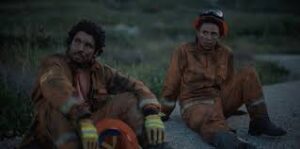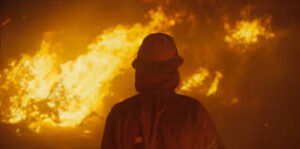
By: Valerie Milano
Palm Springs, CA (The Hollywood Times) 11/1/2024 – Every year, Californians from San Diego to Eureka may find themselves in peril as wildfires come to life and consume the state’s dry and brittle forests. In the last 10 years, California has suffered through more than 3,000 wildfires, a figure that is one-and-a-half times greater than the per-decade average between 1979 and 2009.

That statistic has been driven up by a combination of factors that include the state’s prolonged drought, low humidity, higher temperatures, seasonal winds, most likely exacerbated by climate change. During a 20-month period in 2020-2021, California saw nearly 3.5 million acres of land destroyed, and every year, hundreds of firefighters, paid and volunteer, put their lives on the line in efforts to keep those fires from taking lives, destroying homes, businesses and even entire towns.
It takes literally thousands of brave men and women to quell these blazes, thus the demand for mutual aid during these massive wildfires draws firefighters away from their local responsibilities. This shortage of firefighters within the state has been solved in part with the help of the prison system, with approximately 3,700 prisoners from the state’s low- and medium-security level prisons. The story of these prisoners’ efforts is given the spotlight in writer/director Robin Takao D’Oench’s electrifying short film “Fireline” (2024).

The film follows inmate Otto Reyes (Bobby Soto) as he grapples with the challenges of prison life and his desire to connect with his daughter, against the backdrop of a forest fire. After learning that his early parole was denied, Otto, who is one of hundreds of prison inmates enlisted to battle a California woodland wildfire, desperately tries to call his daughter on her birthday, while he and two fellow inmates work to combat the fire.
Amidst the chaos of being in the field, and an injury to one teammate, Otto is forced to confront the true extent of his obligations. The film highlights the pivotal role prison inmates play in California’s struggle against the forces of nature.

D’Oench sat down recently with The Hollywood Times to talk about his film and explained that the inspiration for the story came from something that happened a little more than a year ago to him and thousands of people in his native New York City.
Click below for our exclusive interview:
“There was this day that the sky turned bright, vibrant orange, and the air tasted like ash and your eyes burned just from being outside,” he said. “For many of us from New York, we had never experienced anything like this.”
The smoke and ash were products of a massive wildfire occurring in Canada that had been carried all the way to the East Coast by the winds.
“For many of us who are from New York, we now have a new relationship with our climate and our environment,” D’Oench said, adding that he was writing a screenplay for Indeed Rising Voices, a program that focuses on providing new opportunities to discover, invest in, and amplify stories created by BIPOC filmmakers.
 “And they were looking for a vision of the future of work, and I took inspiration from Chinese American railroad workers, indentured servants, and an entire American labor system that stems from slavery and wanted to explore what that looked like in a modern context,” he said. “Inmate firefighters were at that intersection between climate and labor.”
“And they were looking for a vision of the future of work, and I took inspiration from Chinese American railroad workers, indentured servants, and an entire American labor system that stems from slavery and wanted to explore what that looked like in a modern context,” he said. “Inmate firefighters were at that intersection between climate and labor.”
 The service provided by these inmates is not without reward incentives for those who are willing to put their lives on the fire line. Among those incentives are better food, more yard/outdoor time on a daily basis along with time served credits which reduces actual incarceration time.
The service provided by these inmates is not without reward incentives for those who are willing to put their lives on the fire line. Among those incentives are better food, more yard/outdoor time on a daily basis along with time served credits which reduces actual incarceration time.
“For every day an inmate firefighter is on the line, they get a day off their sentence,” D’Oench said, adding that the fire service pay is better than other prison jobs. Inmate firefighters can earn between $5 and $8 a day, versus .15 to .25 cents per day doing something else.
 “Unfortunately, the pathway to employment after the program is very tough,” D’Oench said. “In order to become a licensed woodland firefighter, you need to have an EMT license, and you cannot qualify for your EMT license if you have a felony record.
“Unfortunately, the pathway to employment after the program is very tough,” D’Oench said. “In order to become a licensed woodland firefighter, you need to have an EMT license, and you cannot qualify for your EMT license if you have a felony record.
“So, the only pathway to get that EMT license is to have your record expunged. And as we know, that can take up to two to three years to have your record expunged.”
 Filmed on location in the Angeles National Forest just north of Los Angeles, “Fireline” also stars Joshua Caleb Johnson as Shawn Davies and Fabian Alomar as Primo, Otto’s teammates on the line, and Darin Cooper as Capt. Barnes, the officer supervising them as they battle the blaze.
Filmed on location in the Angeles National Forest just north of Los Angeles, “Fireline” also stars Joshua Caleb Johnson as Shawn Davies and Fabian Alomar as Primo, Otto’s teammates on the line, and Darin Cooper as Capt. Barnes, the officer supervising them as they battle the blaze.
“Fireline” was produced by Fiona Hardingham and Danny Sanches Lugo. D’Oench and visual effects supervisor Celeste Leizer were honored with the Best VFX award at this year’s HollyShorts Film Festival.